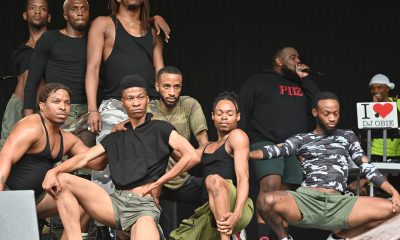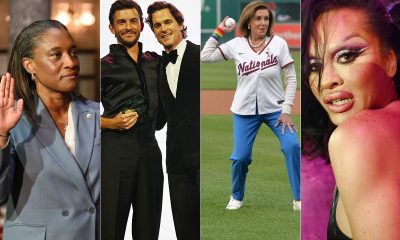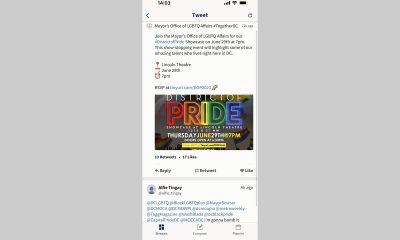Arts & Entertainment
A low-key Black Pride
Organizers plan a more substantive event this weekend
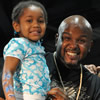
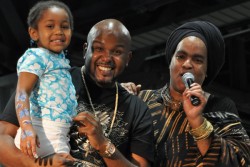
ButtaFlySoul and Rayceen Pendarvis at last year's Black Pride event in Washington. (Blade file photo by Michael Key)
Editor’s note: the full Black Pride schedule is here.
When D.C. Black Pride, the five-day celebration of the metropolitan area’s black LGBT community, unfolds this week, it will be with notably less fanfare than in years past.
Vendors won’t be as prevalent. Crowds are expected to be smaller and more local. Panel discussions on issues affecting the community will number fewer.
It’s a change to D.C. Black Pride as many know it — and organizers say it’s a good thing.
“It’s not bad – the fact is that Black Prides, including D.C., have to reflect on what it is we can do to make a difference in the lives of people in our community,” says long-time event organizer Earl Fowlkes, a 14-year veteran of Black Lesbian and Gay Pride Day Inc., the 501(c)(3) that oversees the event. “We’re doing much more advocacy and much more community service.”
After a generation hosting one of the nation’s premier Memorial Day events for black gays and lesbians, the organization is shifting attention toward a slate of year-round workshops it says better serve an audience with changing priorities.
It means lower-key Pride celebrations with fewer offerings. But organizers say the tradeoff is attention to practical issues that matter to black gays and lesbians more than all-night parties and rainbow flags.
“It’s really about being relevant and being around for the next 20 years,” Fowlkes says.
Make no mistake — the event running from Thursday through Monday will feature many long-time staples: The writer’s forum, film festival and a poetry slam with a $250 grand prize are among the audience favorites that haven’t gone anywhere.
But changes also are apparent: A long-running vendor marketplace, for instance, has disappeared. Panel discussions on topics like depression in gay black men, meanwhile, will number fewer than in recent years.
Part of the reason is economic.
“We have scaled down some of our expenses so we can really focus on being a year-round organization,” Fowlkes says, adding the group also has been impacted as nonprofit donations have slowed.
In 2011, the organization plans community outreach surrounding domestic violence and LGBT foster parenting. Providing career-building help, targeting youth and transgender men and women especially, is another goal.
It’s a return to basics for the event, founded in 1991 to help raise money for HIV/AIDS organizations as well as provide a Memorial Day meeting ground for area gays and lesbians of color. The event has since grown to attract up to 30,000 attendees, Fowlkes says. This year, like last year, is expected to bring in about 15,000 as some would-be attendees head to fledgling Black Pride events around the country.
“In many ways, [D.C.] Black Pride is a victim of our own success,” says Fowlkes, who heads the International Federation of Black Prides, a growing umbrella group representing 35 black prides from Toronto to San Diego. “People see that it’s not difficult to do [an event] and people who are entrepreneurs have taken advantage.”
At the same time, the audience is changing, he says.
“Some people were coming to the Pride in the early years when they were 23,” he says. “Now they’re in their 40s and now coming to our form of celebration is not as refreshing and new as it was.”
Jack Hairston understands that sentiment. An attendee since the early ’90s, at 49, he said he’s lost interest in the party aspects of Pride. He says organizers are on the right track by shifting gears, but also need to ramp up efforts to reach the next generation of black gays and lesbians.
“They think it’s all about parties and D.C. is not giving the best parties anymore – so why even come?” he says. “[Leaders] need to recruit the right people across the age groups to keep it relevant.”
Fowlkes says crossing generational boundaries is a high priority for the group. This year, for instance, he says the board included two young adults who later bowed out due to scheduling conflicts. Also, among the panel discussions planned for this weekend is one titled, “Does the Black LGBT Community Really Care About Black Youth?”
But the fledgling efforts ring hollow for B. “Breeze” Bennett, a 25-year-old area party promoter and community personality. She could think of only one person under age 35 who is directly involved with the group and saw little outreach on the many e-mail lists she belongs to.
“It seems like they’re definitely interested in spirit,” she says of the Black Pride board’s efforts to recruit young leaders. “I would just like to see more action behind those sentiments and more resourceful outreach – just a bit more gumption.”

Team DC, the umbrella organization for LGBTQ-friendly sports teams and leagues in the D.C. area, held its annual Night of Champions Awards Gala on Saturday, April 20 at the Hilton National Mall. The organization gave out scholarships to area LGBTQ student athletes as well as awards to the Different Drummers, Kelly Laczko of Duplex Diner, Stacy Smith of the Edmund Burke School, Bryan Frank of Triout, JC Adams of DCG Basketball and the DC Gay Flag Football League.
(Washington Blade photos by Michael Key)




















The 2024 National Cannabis Festival was held at the Fields at RFK Stadium on April 19-20.
(Washington Blade photos by Michael Key)
















Covering the @NatlCannaFest at RFK Stadium for @WashBlade . Stop by the LGBTQ+ booth and pick up a paper if you are here. pic.twitter.com/is7hnsaPns
— Michael Patrick Key (@MichaelKeyWB) April 20, 2024
Theater
‘Amm(i)gone’ explores family, queerness, and faith
A ‘fully autobiographical’ work from out artist Adil Mansoor

‘Amm(i)gone’
Thorough May 12
Woolly Mammoth Theatre
641 D St., N.W.
$60-$70
Woollymammoth.net
“Fully and utterly autobiographical.” That’s how Adil Mansoor describes “Amm(i)gone,” his one-man work currently playing at Woolly Mammoth Theatre.
Both created and performed by out artist Mansoor, it’s his story about inviting his Pakistani mother to translate Sophocles’s Greek tragedy “Antigone” into Urdu. Throughout the journey, there’s an exploration of family, queerness, and faith,as well as references to teachings from the Quran, and audio conversations with his Muslim mother.
Mansoor, 38, grew up in the suburbs of Chicago and is now based in Pittsburgh where he’s a busy theater maker. He’s also the founding member of Pittsburgh’s Hatch Arts Collective and the former artistic director of Dreams of Hope, an LGBTQ youth arts organization.
WASHINGTON BLADE: What spurred you to create “Amm(i)gone”?
ADIL MANSOOR: I was reading a translation of “Antigone” a few years back and found myself emotionally overwhelmed. A Theban princess buries her brother knowing it will cost her, her own life. It’s about a person for whom all aspirations are in the afterlife. And what does that do to the living when all of your hopes and dreams have to be reserved for the afterlife?
I found grant funding to pay my mom to do the translation. I wanted to engage in learning. I wanted to share theater but especially this ancient tragedy. My mother appreciated the characters were struggling between loving one another and their beliefs.
BLADE: Are you more director than actor?
MANSOOR: I’m primarily a director with an MFA in directing from Carnegie Mellon. I wrote, directed, and performed in this show, and had been working on it for four years. I’ve done different versions including Zoom. Woolly’s is a new production with the same team who’ve been involved since the beginning.
I love solo performance. I’ve produced and now teach solo performance and believe in its power. And I definitely lean toward “performance” and I haven’t “acted” since I was in college. I feel good on stage. I was a tour guide and do a lot of public speaking. I enjoy the attention.
BLADE: Describe your mom.
MANSOOR: My mom is a wonderfully devout Muslim, single mother, social worker who discovered my queerness on Google. And she prays for me.
She and I are similar, the way we look at things, the way we laugh. But different too. And those are among the questions I ask in this show. Our relationship is both beautiful and complicated.
BLADE: So, you weren’t exactly hiding your sexuality?
MANSOOR: In my mid-20s, I took time to talk with friends about our being queer with relation to our careers. My sexuality is essential to the work. As the artistic director at Dreams of Hope, part of the work was to model what it means to be public. If I’m in a room with queer and trans teenagers, part of what I’m doing is modeling queer adulthood. The way they see me in the world is part of what I’m putting out there. And I want that to be expansive and full.
So much of my work involves fundraising and being a face in schools. Being out is about making safe space for queer young folks.
BLADE: Have you encountered much Islamophobia?
MANSOOR: When 9/11 happened, I was a sophomore in high school, so yes. I faced a lot then and now. I’ve been egged on the street in the last four months. I see it in the classroom. It shows up in all sorts of ways.
BLADE: What prompted you to lead your creative life in Pittsburgh?
MANSOOR: I’ve been here for 14 years. I breathe with ease in Pittsburgh. The hills and the valleys and the rust of the city do something to me. It’s beautiful, it’ affordable, and there is support for local artists. There’s a lot of opportunity.
Still, the plan was to move to New York in September of 2020 but that was cancelled. Then the pandemic showed me that I could live in Pittsburgh and still have a nationally viable career.
BLADE: What are you trying to achieve with “Amm(i)gone”?
MANSOOR: What I’m sharing in the show is so very specific but I hear people from other backgrounds say I totally see my mom in that. My partner is Catholic and we share so much in relation to this.
I hope the work is embracing the fullness of queerness and how means so many things. And I hope the show makes audiences want to call their parents or squeeze their partners.
-

 District of Columbia5 days ago
District of Columbia5 days agoNew D.C. LGBTQ+ bar Crush set to open April 19
-

 District of Columbia5 days ago
District of Columbia5 days agoReenactment of first gay rights picket at White House draws interest of tourists
-

 Arizona5 days ago
Arizona5 days agoAriz. governor vetoes anti-transgender, Ten Commandments bill
-

 South America3 days ago
South America3 days agoDaniel Zamudio murderer’s parole request denied

